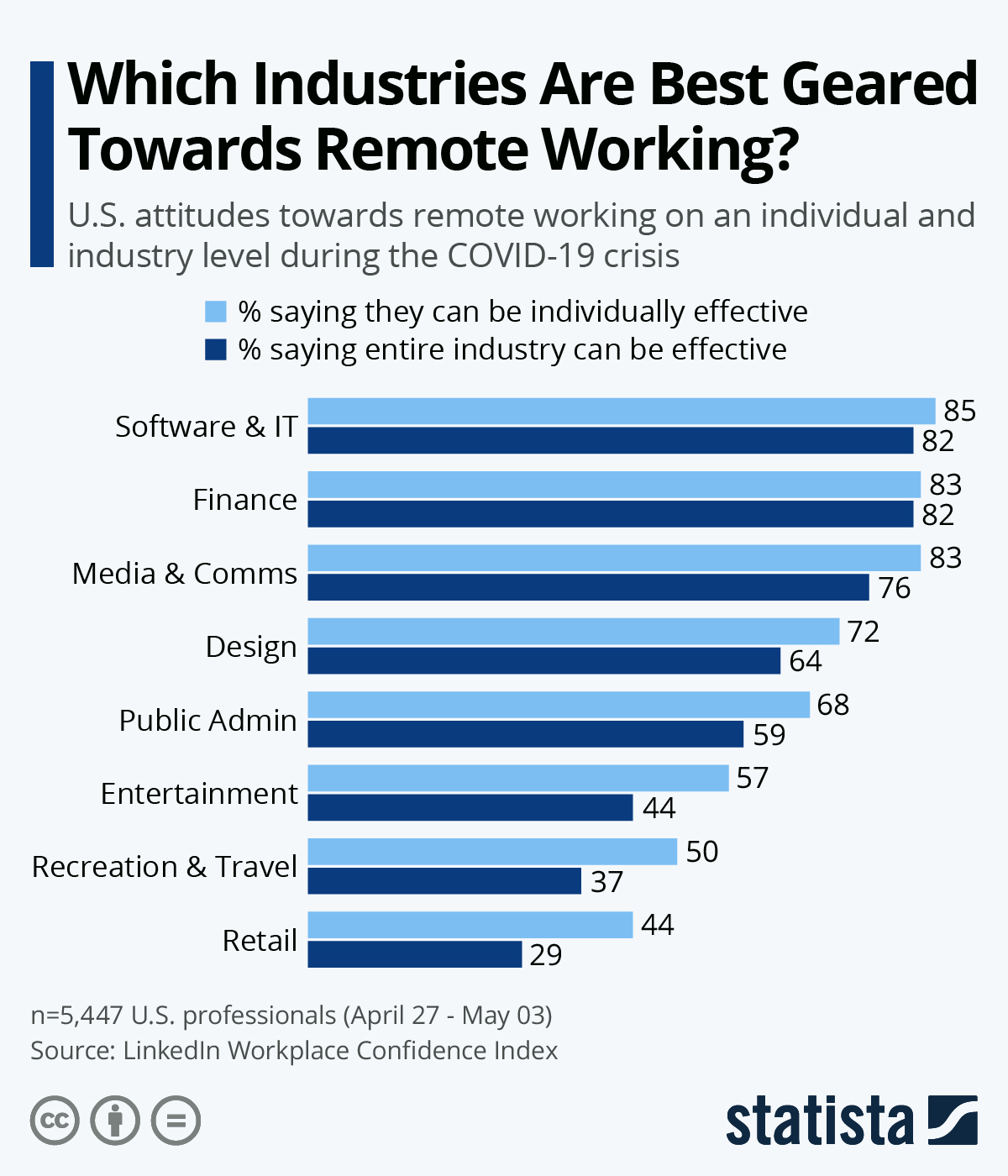Results from a LinkedIn survey reveals which industries are best suited for remote working conditions.
Approximately more than half of U.S. professionals believe that their industry can sustain remote working conditions, this is according to LinkedIn’s latest Workforce Confidence Index report.
55% of the roughly 5,000 U.S.-based professionals in the LinkedIn user study conducted 27 April to 3 May said that their industry can effectively operate while implementing remote work.
When asked about their personal capacity to be effective in a work-from-home setup, the results registered a higher 65% share.
Note that these figures reflect the overall sentiments of the U.S. professionals included in the survey. The level of optimism between industries turns out to be sparse.
Differing alignments
There are some industries where employees believe that they, as individuals, have the capacity to perform tasks effectively in a remote work set-up and that their industry has the ability to effectively sustain remote work at the same time:
- Software & IT
Individual effectiveness: 85%
Industry effectiveness: 82% - Finance
Individual effectiveness: 83%
Industry effectiveness: 82% - Media & Comms
Individual effectiveness: 83%
Industry effectiveness: 76%%
The similarity of the self-perceived individual and industry effectiveness ratings indicates a proper alignment between the industry and employee effectiveness
This alignment is not seen across all industries, however. There are industries where individual effectiveness is high but industry effectiveness is perceived to be rather low:
- Design
Individual effectiveness: 72%
Industry effectiveness: 64% - Public Admin
Individual effectiveness: 68%
Industry effectiveness: 59% - Entertainment
Individual effectiveness: 57%
Industry effectiveness: 44%
This scenario may be attributed to these industries having a significant chunk of jobs demanding the physical presence of their employees.
Lastly, there are industries where professionals believe that neither they nor their industry can be effective in a remote work set-up:
- Recreation & Travel
Individual effectiveness: 50%
Industry effectiveness: 37% - Retail
Individual effectiveness: 44%
Industry effectiveness: 29%
These industries are clearly ill-suited for remote work since almost the entirety of their employees are required to be physically present to make operations possible.
No cookie cutters
The results of the LinkedIn survey suggest that not all offices may have to stick around.
Industries which have the capacity to perform well in remote working conditions can sever the invisible chain between work and the physical corporate office which, if leveraged properly, may lead to increased productivity and better well-being for employees.
On the flip side, this also reveals that some industries — either due to their current configurations or their nature — will have to maintain physical presence in offices.
In the context of a global pandemic, this is a signal for companies to assess their operations. Is a flexible working condition permissible and would it be beneficial, all things considered? If yes, planning and working the way towards this transition is in order.
If not, then it is time to come up with ways to protect workers who, in times of crisis situations like what we are facing right now, might be risking their lives in order to keep businesses up and running. Building resilience in the event that workers do end up being unable to work is also imperative to avoid the massive layoffs we have seen in the past few months.
In the future of work, doing away with the physical office may not necessarily be the next step. There are no cookie-cutter solutions when it comes to creating workplaces that are fair, inclusive, safe, and healthy for everyone. It is rooted in a deeper understanding of what is truly needed to attain improvement.











